By Trudy Horsting
We are all thankful for what judges do for our activity. However, for many people, no matter how long you have been performing, the life of a judge feels unfamiliar, and becoming a judge feels inaccessible.
In this series, we strive to remove some barriers that make judging WGI feel so foreign by sitting down with a color guard, percussion, and winds judge. In this story, Hieu Nguyen provides his insight on judging for WGI Color Guard.
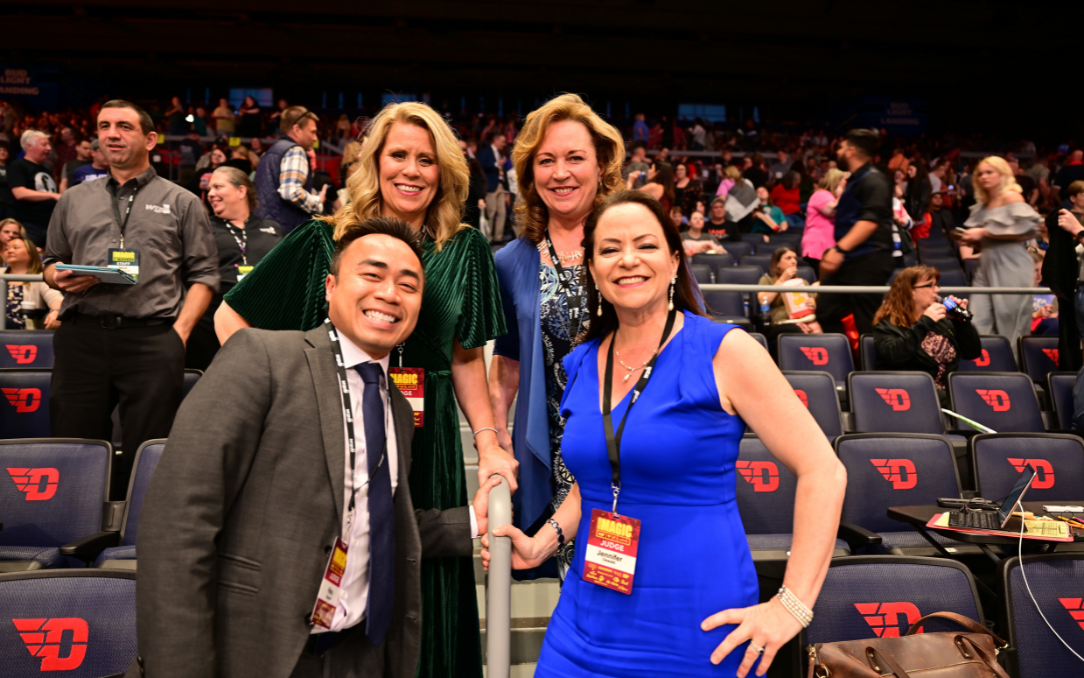
The Beginnings
Hieu, like many of us, grew up with no idea what color guard was. He says, “I walked into the first day of band camp my freshman year of high school and I saw these flags going up and down together out of the corner of my eye. I thought it was the coolest thing. It was so visually appealing to me.” On his lunch break, he asked if he could give it a try. He was given a flag and told to go home and practice for winter guard auditions.
Hieu says, “I’ve always been a band person and I played all the way through college as well. But after I started winter guard I was hooked. I did two years of marching band playing instruments but junior year I transitioned to color guard. I suppose the rest is history.”
Hieu continues, “When I went on to college I had a very firm mindset in terms of who I wanted to be as a performer. Some of my first instructors are now my judging colleagues and I had such a great experience performing with them.”
Hieu says, “I think a major turning point for me was when we attended the 1998 Boston WGI regional. They took six teams to finals, and we were in sixth place that year.” However, Hieu says performing in finals wasn’t even the best part. “The most amazing part of the experience was seeing all of other the incredible color guard performers. It was also one of the first time I had seen so many male performers and that was so inspiring to me. I knew I would be involved in this activity for a long time.”
The Journey To Judging
However, at the beginning, Hieu didn’t know he would become a judge. He says, “I started law school in 2006 and at that time I had a solid of understanding of what it meant to be a full-time instructor and director. I knew that going to law school would not be conducive to doing those things full time. But I knew I wanted to maintain my involvement in the activity somehow. I asked myself, ‘how can I make the greatest impact while being able to sustain a sense of my career goals?’” Hieu says that’s when he knew that judging was the best move for him.
Of course, it’s not as simple as deciding to be a judge. Hieu says, “I was very fortunate to get my start in Massachusetts. I had some really great colleagues in the Massachusetts Judging Association and there I began the introductory phase of judging.” The beginning of the process is all about the fundamentals and learning the philosophy of judging. He says, “It’s not just about the scoring and the commentary but how you carry yourself and the level of professionalism that’s expected of you. The three pillars of judging are scoring, commentary, and level of professionalism. These are expected of every judge, no matter the level.”
Hieu explains that the process of becoming a judge involves frequent practice. He says, “You have to put yourself out there and work on your commentary as much as you can. The more you practice, the more comfortable you become.”
Hieu explains that the expectations you have going into the journey may not be fulfilled. This is because judging is incredibly different from performing. At the beginning, it’s an exploratory process to figure out which caption may be the best fit for you. What you are best at judging may not be where you excel the most on the floor. It’s incredibly helpful to talk to mentors to see where you may be best suited, Hieu emphasizes.
“You may think that you would be good at one caption but later realize it’s not for you. I started with the equipment caption because I thought it was a no brainer, but after judging equipment, I realized it wasn’t the best fit for me. It came more naturally for me to verbalize what I was seeing on the floor in the movement caption,” Hieu says.
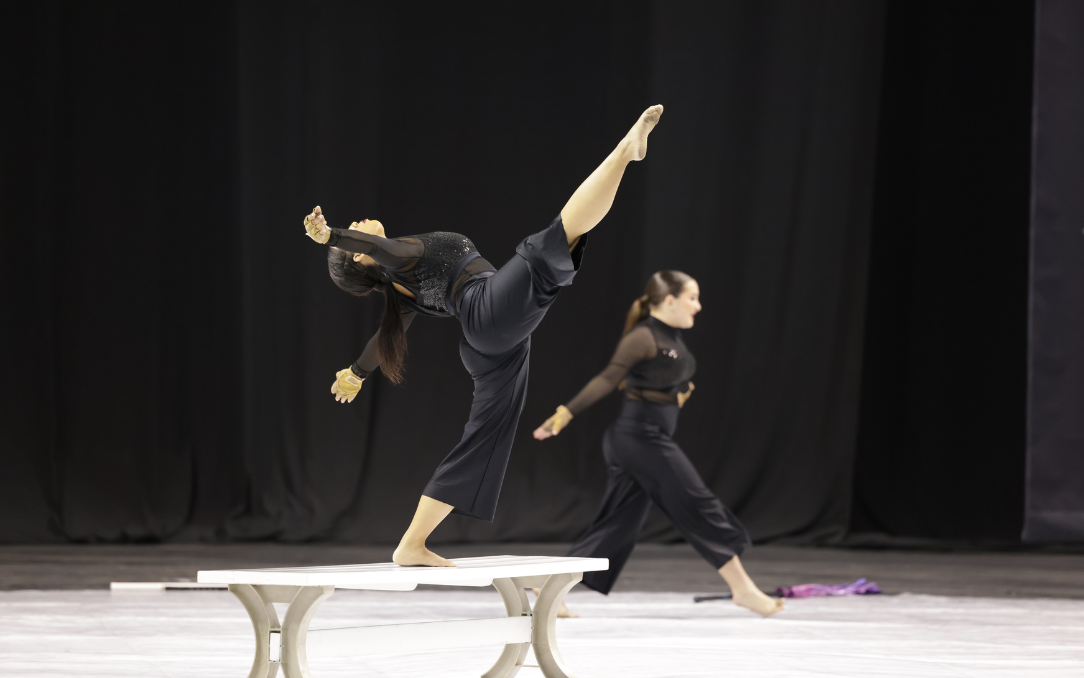
As you evolve as a judge, Hieu believes it’s easier to cross over to different captions, including upstairs and downstairs captions.
“As time has progressed, I certainly feel much more comfortable judging equipment. I now also judge the ensemble caption as well,” Hieu says. “If you’re more analytical you may be best suited for a downstairs caption or if you’re more introverted it may be your natural inclination,” he says.
Transitioning To WGI
Transitioning to become a WGI judge can be intimidating. “I was a little apprehensive at the beginning because I was still pretty new to the world of judging,” Hieu says. “I trialed for a season and then did one season of local shows and from there, I transitioned to WGI.” Hieu explains that much of his transition was thanks to colleagues within the judging association who saw his potential and encouraged him, telling him that he was ready.
“To be honest, it was a bit faster than I had anticipated but I was certainly ready for the challenge. Most importantly, I had the right mentors and the right people supporting me. They believed in me, gave me the nudge I needed, and then supported me throughout the journey. Together they helped me grow in the craft in a very short period of time.”
Hieu says, “I was inspired by the quality of people around me who were motivating me and teaching me how to judge through their amazing mentorship.” Hieu explains that he’s never looked back.
A Weekend In the Life
A judging weekend starts before the weekend begins and ends after the weekend is over. “Prior to each weekend I take a look at the schedule for the competition to prepare. I also take time to think about two things that I need to work on that I will focus on throughout the weekend,” Hieu says. “Throughout the competition, I make a conscious effort to improve those things. If you can commit to two objectives each weekend, over time you’ll become an exponentially better judge.”
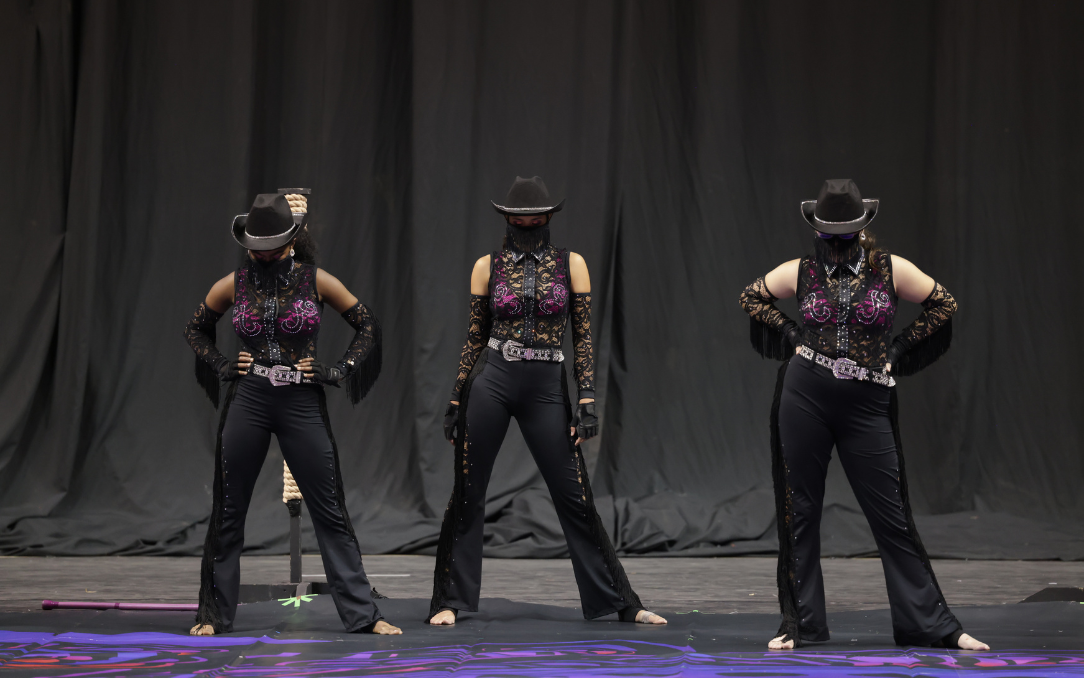
“After the weekend is over, we take a look at the work we’ve done and analyze any potential for growth in our numbers and our commentary. We take time to explore what we can improve on and what we did well. Then, after a week of ‘real life,’ the cycle begins again at the next competition.”
The Joys of the Job
“The best part of the job is the friendship and the camaraderie that you have with your colleagues. There is a heavy workload but at the end of the day, you have the best people around to share the experience with you. The people I work with are so committed to this activity. They all want to do their very best for the performers, for the instructors, and for the activity as a whole. That is what inspires us to be the best that we can be when we are judging each show. Sharing that experience with my fellow adjudicators has been so life changing for me.”
Another joy of the job Hieu discusses is the opportunity to travel all over the world. “I’ve been given the opportunity to travel to Europe extensively and I also got to judge the Japanese regional. It is incredible to see the activity grow throughout different regions of the world and I’m so glad to be a part of that journey and see the activity in such a global perspective.”
Of course, another perk is having the best seats in the house at competitions. “We’re just right there with the performers and there’s no other experience like that,” Hieu says. “It’s amazing to see the level of excellence that is shared and how closely connected we are in this community.”
He continues, “Judges judge because we love the activity, and we work so hard to improve our craft week to week. One thing I love about this activity is that if you apply the information provided, you will be rewarded. It is really anyone’s game out there, and that makes the judging process so exciting.”
The Challenges of Judging
Hieu says, “I think one of the most challenging parts of judging is acknowledging that it’s a constant journey of growth. Becoming a good judge doesn’t happen overnight. The process is all about reflecting, improving, and being open to criticism. Self-reflection and a willingness to grow and adapt are critical.”
Hieu continues, “If you’re committed to growth, you will grow over time. Take in all of the information you can from your colleagues and apply the advice they can offer.”
That said, growth doesn’t mean perfection. A part of any job is learning from your mistakes. “You will screw up,” Hieu says. “In order to be the best WGI judge you need to acknowledge your errors and take every opportunity to learn from your mistakes. This is just as critical for judges as it is for performers and instructors. That is a part of the journey we all take. Learning from these mistakes is what makes us great.”
Hieu explains the long hours are also a challenge. “For a one day regional we’re up very early and might not end until 11pm. For a two-day regional, you’re done at 11pm and then are back up at 6am for the next day of competition. However, the most challenging part is that after those long weekends, you come back to a regular Monday through Friday job.”
Hieu describes it can be a challenge to let go and be present in every moment of competition during such long days. However, he says,“Every performer out there deserves the opportunity to have your best work. Your best work needs to last all day, for every group, no exceptions.”
Sacrifices Made For the Activity
Everyone makes sacrifices to participate in this activity. Hieu says, “I always wonder what I would be missing if I wasn’t judging or wasn’t traveling. But, whenever I wonder, I always conclude that I must not be missing all that much because I love what I do.”
That said, getting downtime is a challenge. “As I get older, I find I truly value downtime and having a moment to decompress and relax. That is probably the hardest thing that I have had to compromise on. We have a small window of opportunity when we get home from our flights on Sunday to relax and prepare for the week ahead.” But Hieu reiterates, “If you love what you’re doing, it’s absolutely worth it.”
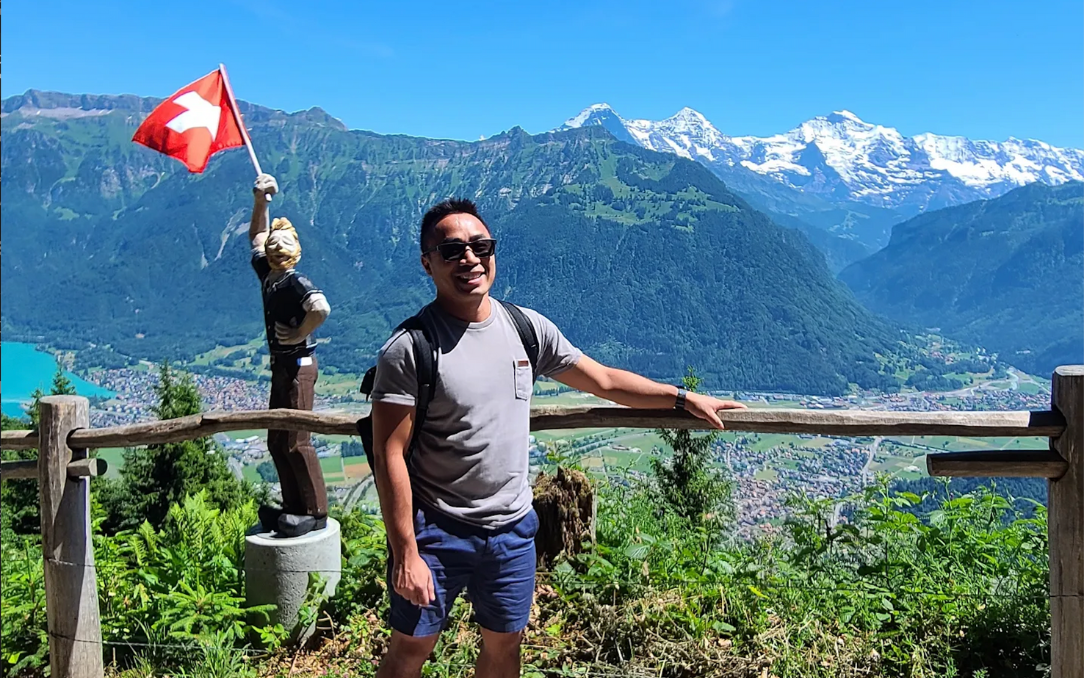
As an attorney, Hieu also explains that it’s nice to have an artistic outlet. “Choreographing, teaching, and judging are all so fulfilling for me. And I think I speak for all judges when I say judging doesn’t feel like work because we love what we’re doing.”
The Future of the Activity
“As a movement judge, although it applies to all aspects, I really would like to see a deeper sense of training and fundamentals. I would encourage all instructors to really take the time to invest in their performers. I think the activity has perhaps gone a bit too far in terms of figuring out the best tricks possible because it has caused us to lose the sense of nuance and connection within the movement and equipment. There is an opportunity for performers and instructors to really celebrate refined technique, connection, expression, and dynamics. There has to be a sense of balance within the difficulty and the risk that we value within the activity and the clear, refined technique which serve as our fundamentals.”
Hieu says, “We have an obligation to go beyond teaching the performers how to do certain tricks. We need to teach them how to get there from a technique perspective and focus on the fundamentals within each skill.”
In the movement caption specifically, Hieu thinks we’ve come a long way. That said, “There is still an opportunity to reach a higher trajectory and ask more of our performers. It is absolutely within our reach.”
“In terms of the activity as a whole, I would love to see a greater presence in everyday life. We kind of live in our own universe and as the activity continues to grow, I would love to see more exposure. It would be amazing to see the activity discussed in everyday conversation like sports. It’s so deserving of more visibility as a highly sophisticated form of art that anyone can truly enjoy.” He continues, “I think we can get to that point of exposure where the whole world can enjoy and appreciate color guard.”
Advice to Those Interested in Judging
Hieu recommends that anyone interested in judging reach out to their local judging association and inquire about the first steps. Most circuits have the tools and resources for you to begin the judging process. Further, there are now so many online resources which help prospective judges learn the foundation.
Hieu explains, “There is a need for judges at all levels. There are so many units out there who would benefit from your insight and ability and experience. Your voice can help programs progress.” Further, having diverse perspectives is so important. “Different experiences and perspectives are so valued in the judging community. We don’t want all judges to sound the same. Your individual experience, whether that is teaching or writing choreography or designing, gives you value and translates into the nuanced information you can deliver for the performers.”
He reiterates, “We are always looking for great people to join our ranks locally, regionally, and at the international level. If you are really interested in judging, find someone you trust to give you insight on the process. Having a mentor is so important. It is a long process, and you will excel to a much higher level if you’re open to information and mentorship.”
If you are remotely interested in judging, start exploring the idea. “Dig into the online courses and learn more about the process. Reach out to your local circuit and find someone to talk to. When you’re ready, we’ll be here to receive you and offer any additional training you might need.”
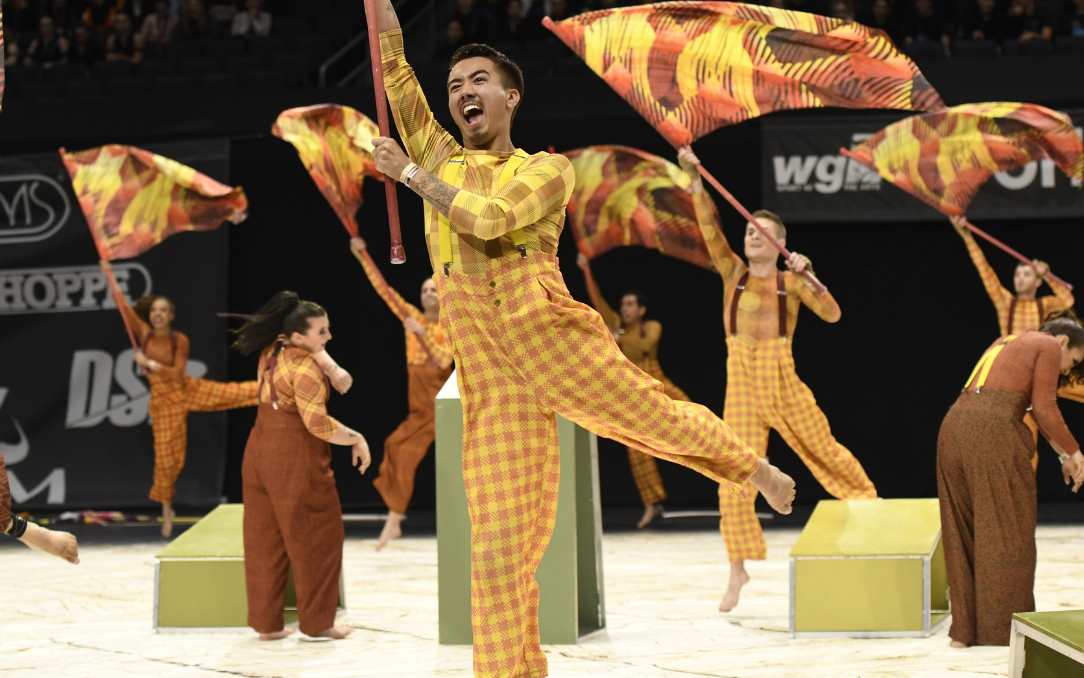
Hieu also offers advice for instructors and performers. He says, “It is so valuable to have a deeper understanding of the judging system and what judges are looking for. Having a greater understanding will help you acknowledge potential areas for growth.” Hieu has experienced this firsthand. “When I started judging my writing and my choreography became exponentially better because I gained a deeper understanding of exactly what the judges are looking for. I now know how to better set up my performers for success. I think that’s the biggest piece of advice I can offer instructors. Learn the judging system and apply that to the work you do on the floor.”
About the Author:
Trudy Horsting is a graduate student at Arizona State University pursuing her Ph.D. in Political Science. She holds a MA in Political Science from ASU as well as a BA in Political Science and a BA in Writing, Rhetoric, and Technical Communication from James Madison University. While at JMU, she was a four year member and two year captain of the Marching Royal Dukes Color guard and JMU Nuance Winter guard. She was a member of First Flight World Winter guard in 2019 and FeniX Independent World Winter guard in 2020.






























